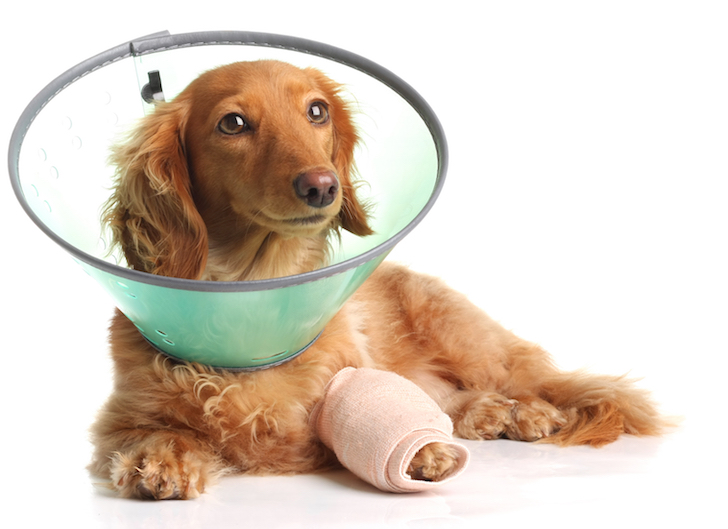Throughout my career as a veterinarian specializing in small dog breeds, I have encountered numerous Dachshunds. These charming dogs, known for their elongated bodies and short legs, are prone to specific health issues due to their unique physical characteristics. This article is designed to educate Dachshund owners about common diseases in Dachshunds and offer practical tips for preventive care. The guide will cover nine common health problems, provide advice on prevention, and address frequently asked questions. Familiarizing yourself with these conditions will help you recognize early signs of trouble and ensure the well-being of your Dachshund.

Common Diseases in Dachshunds All Owners Should Know About
Intervertebral Disc Disease (IVDD)
Intervertebral Disc Disease is the most important health issue for Dachshunds. Their long spines make them more prone to this condition, which can cause intense pain and potential paralysis if not addressed.
Signs of IVDD include:
- Reluctance to move or jump
- Obvious discomfort or pain
- Limping or dragging hind legs
- Loss of bladder control
Diagnosis usually involves a mix of physical exams, neurological assessments, and imaging tests like X-rays or MRI scans. Treatment options vary from conservative approaches like rest and medication to surgery for severe cases.
To prevent IVDD, it’s essential to:
- Maintain a healthy weight
- Use ramps or stairs for furniture access
Avoid activities that strain the spine.
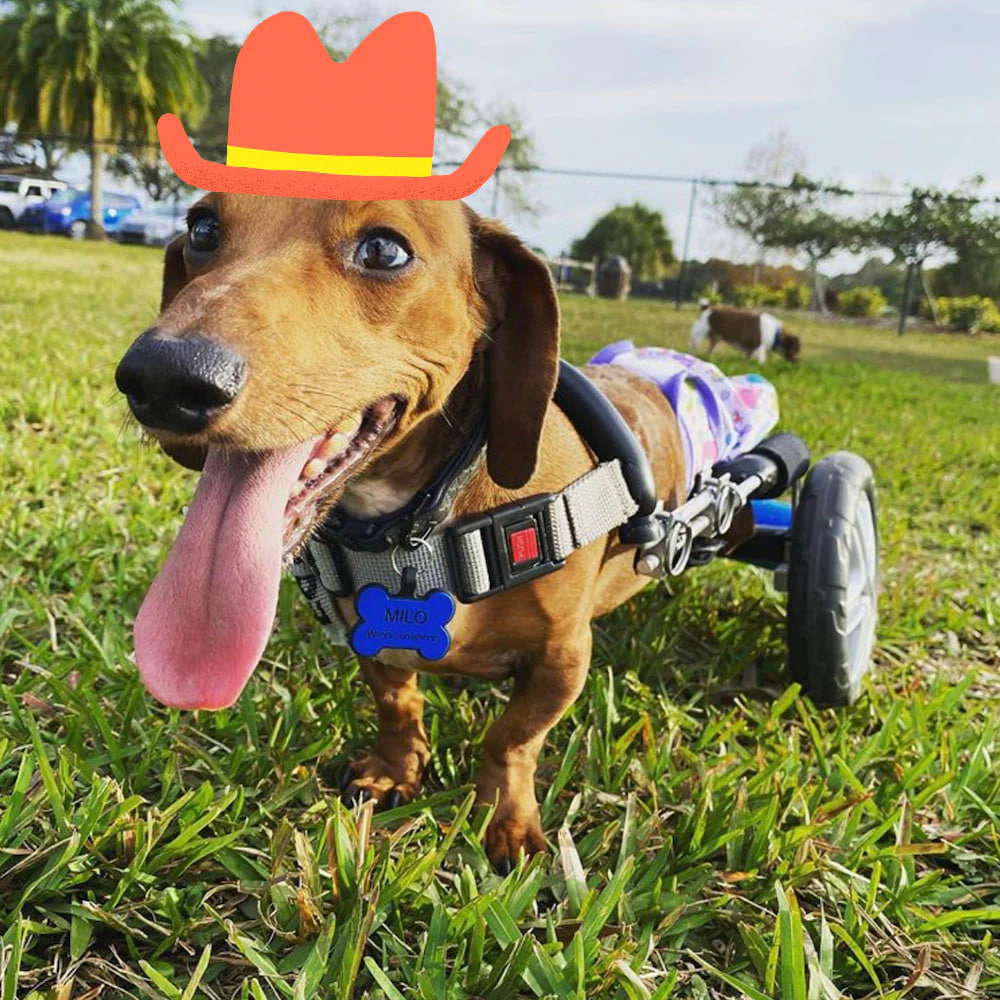
Obesity
Obesity is a major issue for Dachshunds because carrying extra weight can strain their delicate spines. Signs of obesity in Dachshunds include:
- Difficulty in feeling their ribs without pressing hard
- Absence of a noticeable waistline
- Decreased levels of energy
Being overweight can lead to various health problems such as diabetes, joint issues, and exacerbation of common diseases in Dachshunds like IVDD. Effective ways to manage weight and prevent these health issues include:
- Controlling portion sizes
- Providing regular exercise suitable for the Dachshund’s capabilities
- Refraining from giving table scraps and high-calorie treats.
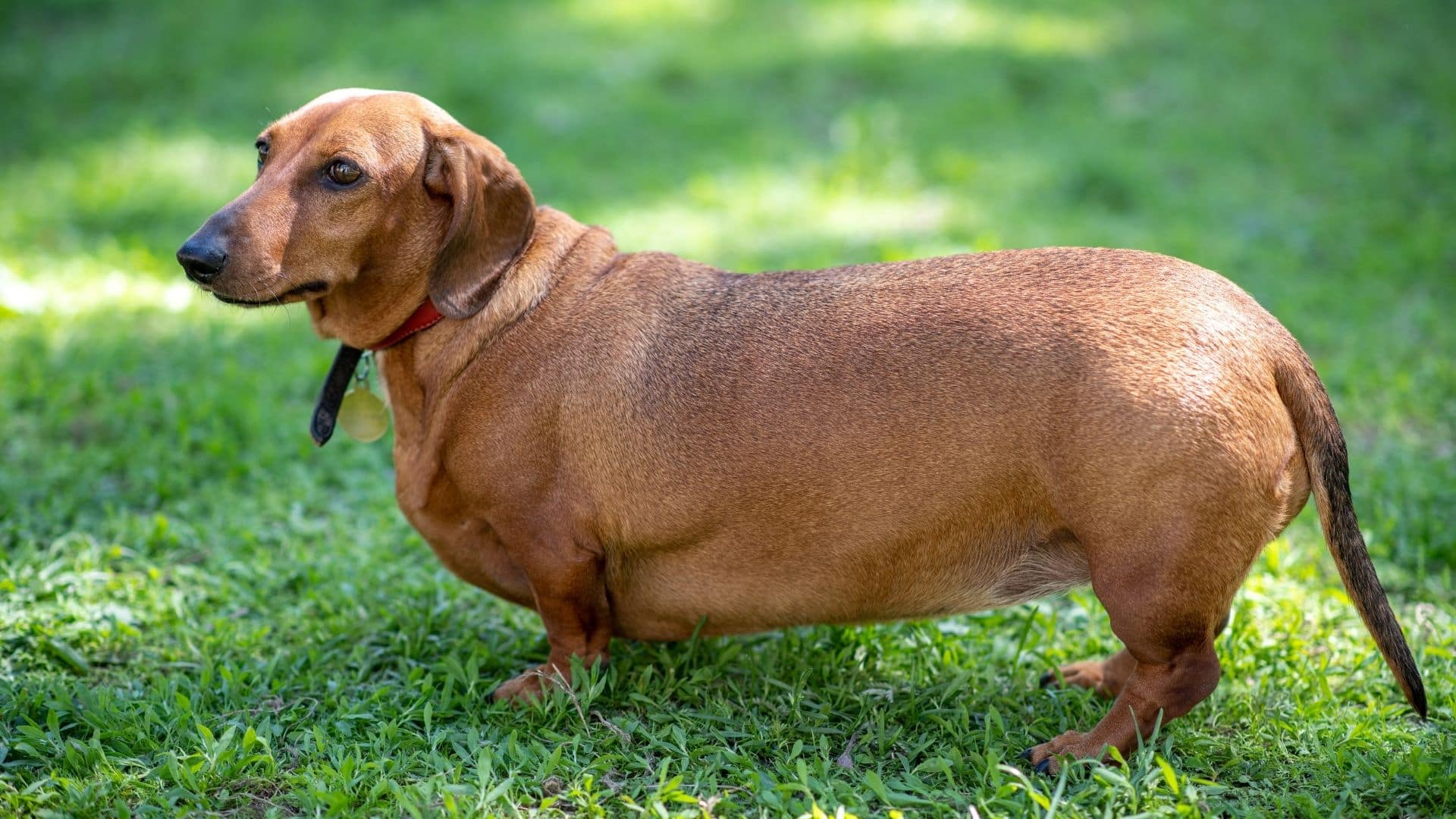
Obesity
Skin Conditions
Dachshunds are prone to various skin problems such as allergies and dermatitis. Common signs include excessive scratching or licking, red and inflamed skin, hair loss, and recurring ear infections. Treatment typically involves identifying and removing allergens, using special shampoos, and sometimes prescription medications. Regular grooming and skin checks are important for early detection and prevention of skin issues.
When discussing skin problems in Dachshunds, a common query from people with allergies is whether this breed is suitable for them. If you’re thinking about getting a Dachshund but worried about potential allergic reactions, you may find our article “Are Dachshunds Hypoallergenic?” helpful for a detailed response to this question.
Understanding both the skin conditions that can affect Dachshunds and their potential to cause allergies in humans is vital for prospective owners. This understanding can assist you in making an informed decision and providing the best care for your pet while managing any allergy concerns.
Eye Problems
Dachshunds are prone to various eye problems such as cataracts and corneal ulcers. Symptoms to be aware of include:
- Hazy appearance in the eyes
- Squinting or increased tear production
- Scratching at the eyes
It is important to detect these issues early by scheduling regular eye check-ups. Treatment methods differ based on the particular problem, ranging from eye drops and medication to surgery for more serious cases.
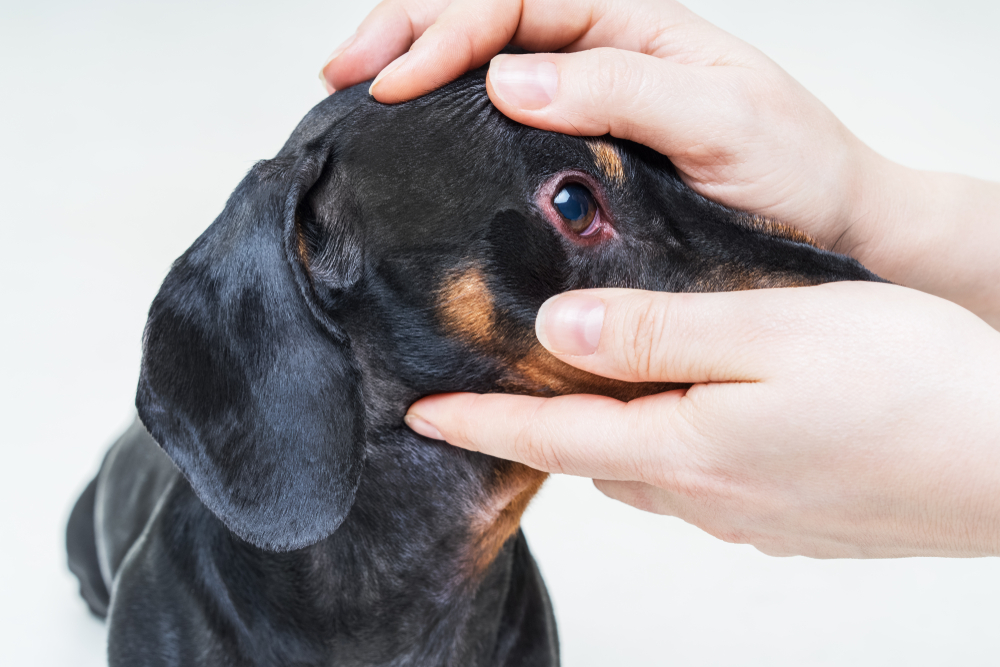
Heart Disease
Although not as common as other illnesses, heart disease is one of the frequent health issues in Dachshunds. Signs to watch out for are:
- Continuous coughing
- Tiredness or decreased ability to exercise
- Quick breathing
The diagnosis usually consists of a mix of physical check-ups, chest X-rays, and echocardiograms. Treatment might involve medications, changes in diet, and adjustments in lifestyle to promote heart wellness.
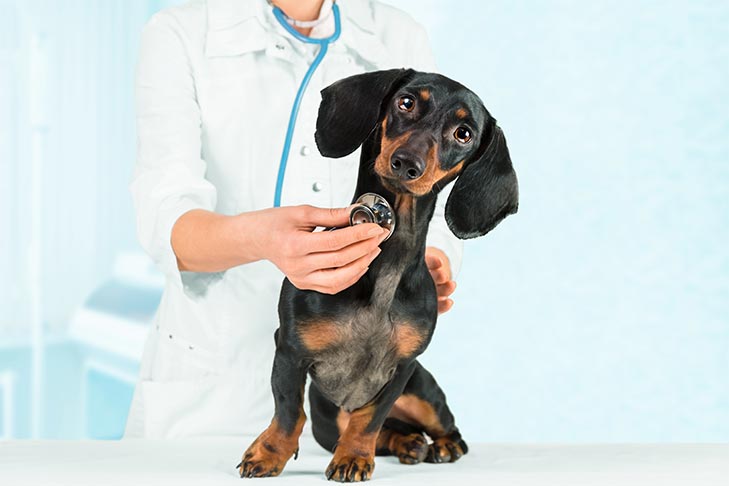
Seizures
Dachshunds can have seizures for different reasons, such as epilepsy. Symptoms of a seizure in Dachshunds may include:
- Abrupt loss of awareness
- Muscle spasms or stiffness
- Involuntary release of urine or feces
If your Dachshund has a seizure, it’s important to promptly consult a veterinarian. Treatment typically focuses on determining the root cause and might involve using anti-seizure drugs.
Hip Dysplasia
Although hip dysplasia is more frequently seen in larger dog breeds, Dachshunds can also be affected by this condition. Signs of hip dysplasia in Dachshunds may include having trouble getting up or going up stairs, showing reluctance to engage in physical activities, and experiencing lameness in their hind legs.
It is crucial to detect hip dysplasia early through physical examinations and X-rays. Treatment for hip dysplasia in Dachshunds varies from managing their weight and adjusting their exercise routine to considering surgery in more severe instances.
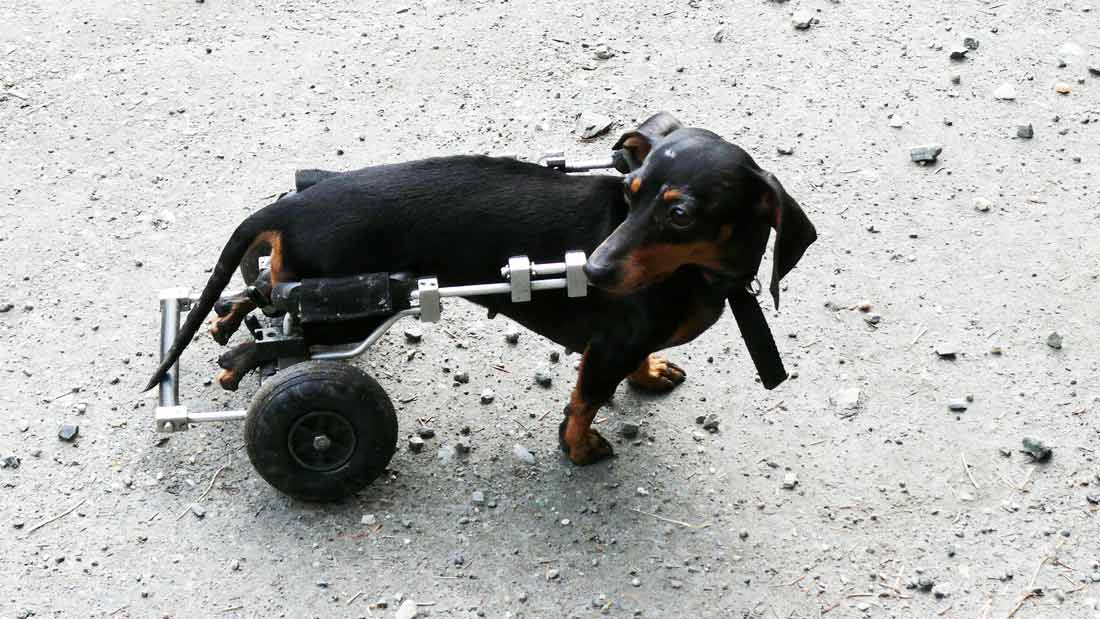
Patella Luxation
Patella luxation, which is the dislocation of the kneecap, is a prevalent condition among Dachshunds. Symptoms may include:
- Occasional limping
- Skipping or hopping when moving
- Reluctance to put weight on the affected leg
The severity of the condition is categorized from 1 to 4. Treatment options range from non-invasive methods like pain management and adjusting exercise routines to surgical intervention for more serious cases.
Cerebellar Abiotrophy in Dachshunds
Cerebellar abiotrophy (CA) is a neurological disorder that can impact Dachshunds. It is identified by:
- Gradual decline in coordination
- Tremors when trying to perform specific movements
- Standing with legs further apart for better balance
Although there is no cure for CA, providing supportive care and making adjustments to the environment can assist affected dogs in leading a high-quality life.
Preventive Care for Common Diseases in Dachshunds
Genetic Testing
Genetic testing is very useful for detecting tendencies to certain health issues, especially IVDD. Conducting tests early enables proactive care and well-informed breeding choices, which can reduce the prevalence of common illnesses in Dachshunds.

Weight Management
Keeping a Dachshund at a healthy weight is very important. Ways to achieve this include providing the right amount of nutritious food, engaging in consistent but gentle physical activity, and refraining from giving too many treats.
Vaccinations and Regular Vet Visits
Keeping your Dachshund’s vaccinations current and making sure to schedule regular vet visits are crucial for catching and preventing health problems early, especially common diseases that affect Dachshunds.
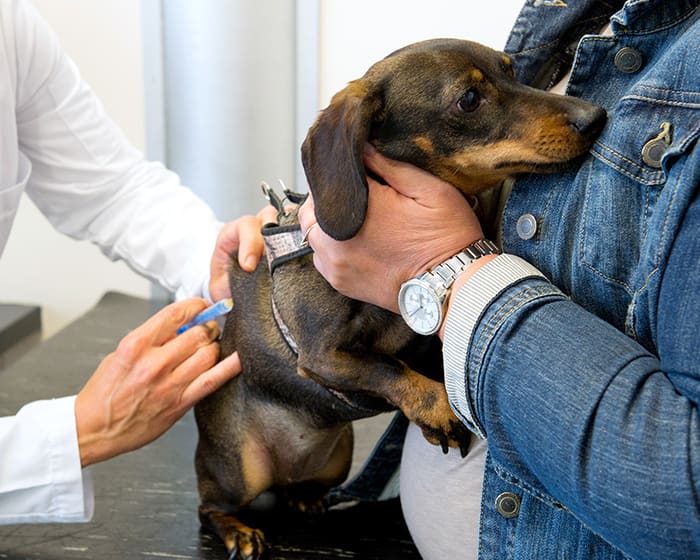
Regular Grooming
Regular grooming is important for keeping the skin and coat healthy and also allows for checking for any issues. Specific grooming tips for Dachshunds include:
- Brushing gently to avoid tangles
- Trimming nails regularly to keep their feet healthy
- Cleaning ears to prevent infections.

Regular Grooming
Diet and Nutrition Tips for Disease Prevention
It is important to provide a well-balanced diet that meets the specific needs of your Dachshund. Factors to consider include:
- Choosing formulas suitable for their age
- Providing supplements that support joint health to prevent IVDD
- Including Omega-3 fatty acids to promote healthy skin and coat
Proper nutrition is key in preventing common health issues in Dachshunds, such as obesity and skeletal problems. Selecting the right food not only helps in maintaining a healthy weight but also ensures your dog receives essential nutrients for overall well-being. For more information on recommended food choices for Dachshunds, refer to our article on the Best Dog Food for Dachshunds.
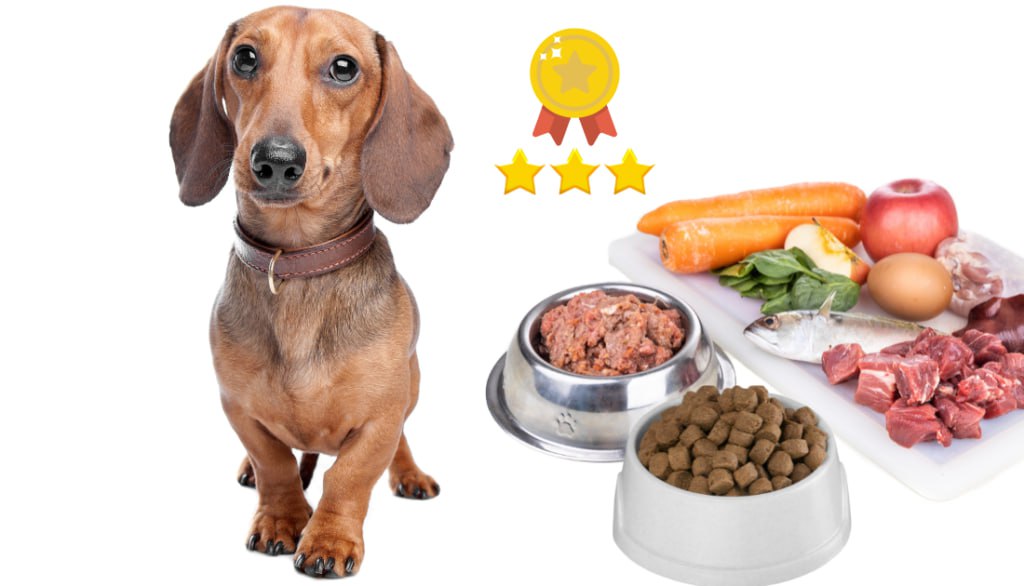
Frequently Asked Questions (FAQs)
How often should I take my Dachshund for check-ups?
Healthy adults should have a check-up at least once a year, but puppies, seniors, or individuals with health issues may need more frequent visits.
Are Dachshunds good for first-time dog owners?
Although they are affectionate and devoted, their possible health problems necessitate a dedicated owner who is willing to dedicate time and resources to their well-being.
How can I safely exercise my Dachshund?
Concentrate on gentle exercises such as swimming or leisurely walks. Stay away from vigorous activities that put pressure on the spine.
Conclusion
It is important to have knowledge about common diseases in Dachshunds to provide them with the best care possible. By staying informed, scheduling regular vet visits, and taking preventive actions, you can ensure that your Dachshund remains healthy and happy. Early detection is crucial for managing many of these diseases, so do not hesitate to seek advice from your vet if you observe any changes in your Dachshund’s behavior or health. With proper care and attention, your Dachshund can live a long and joyful life. Feel free to share your experiences and suggestions in the comments section below!

